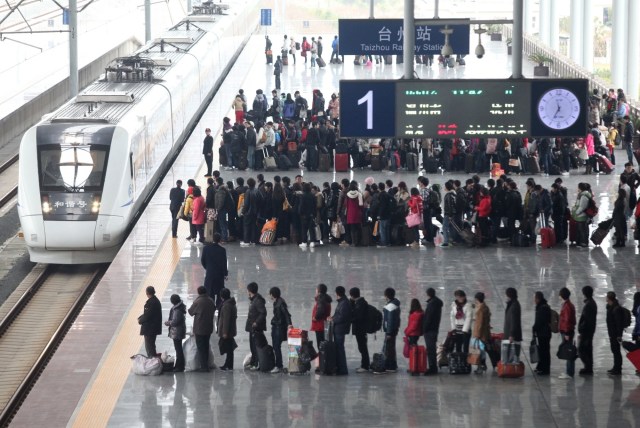Passengers queuing to take a bullet train in Taizhou Railway Station, east China’s Zhejiang province. Pan Kanjun/Xinhua News Agency/PA Images

Thanks to its hybrid communist/capitalist system, China should be a land of equal opportunity.
Ever since Deng Xiaoping said that “to get rich is glorious”, the government has encouraged its people to improve themselves. In an officially class-free society, where the aristocracy was liquidated decades ago, that should mean opportunity for all.
Certainly there are opportunities for the many, as Jim O’Neill observes in an article for Project Syndicate:
“…a young Beijing-based entrepreneur I met recently estimates that at least 20% of Chinese – over 250 million people – are now making $40,000 per year. Besides the United States, no other country in the world has that many people generating that much individual wealth. Whether Westerners like to admit it or not, that is a remarkable achievement.”
In many countries, inequality is as much based on ethnicity as it is on class. China has ethnic minorities – some of them, like the Tibetans and Uighurs, the target of state repression. However, most of this takes place in China’s remotest provinces. The Chinese heartland is ethnically homogenous – with little in the way of immigration from outside the country.
Instead, the powerhouse cities of coastal China have grown through internal migration from rural communities further inland (China’s ‘flyover country’). This is one of the greatest mass migrations in human history – but also a profound source of social division.
The migrants, though Chinese citizens, are subject to the bureaucratically enforced inequalities of the hukou system, which classifies, monitors and discriminates against people according to where in the country they, or their parents, were born:
“I suspect that China’s ultimate undoing could actually be its hukou (household registration) system. This is the arrangement that allows migrants from rural areas to work in cities across China, but does not afford them the same rights as urban-born dwellers. My guess is that very few of these Chinese are among the top 20% of earners.”
The system has ancient origins, but was retained and elaborated by the Communists as an instrument of control. However, until recent decades, China was an overwhelmingly rural country and, even in the cities, the state provided few services – meaning that having the wrong hukou status didn’t carry the same penalties it does now:
“Based on private discussions I have had with Chinese policymakers, I know that they see the current arrangement as a major problem. But they do not want to confront it. Their reasoning is that abandoning the system altogether would impose an unsustainable burden on megacities such as Beijing and Shanghai.
“Still, my hunch is that something will have to change eventually. A two-tier system in which almost half the population enjoys Western levels of wealth while the rest have no right to health care or social security cannot survive another 15 years.”
Arguably, we in the West have our own hukou system – one with three tiers. There are full citizens at the top, followed by legal immigrants with certain rights of residency and, finally, at the bottom, illegal immigrants with no rights of residency.
The key difference, of course, is that the rough end of the hukou system – which includes internal passports – applies to Chinese citizens in their hundreds of millions, not to a comparatively small number of non-citizens.
O’Neill is therefore right to speak of China’s potential “undoing”. To have not just the countryside, but also the cities, heaving with so many second class citizens is a threat to the country’s stability.










Join the discussion
Join like minded readers that support our journalism by becoming a paid subscriber
To join the discussion in the comments, become a paid subscriber.
Join like minded readers that support our journalism, read unlimited articles and enjoy other subscriber-only benefits.
Subscribe